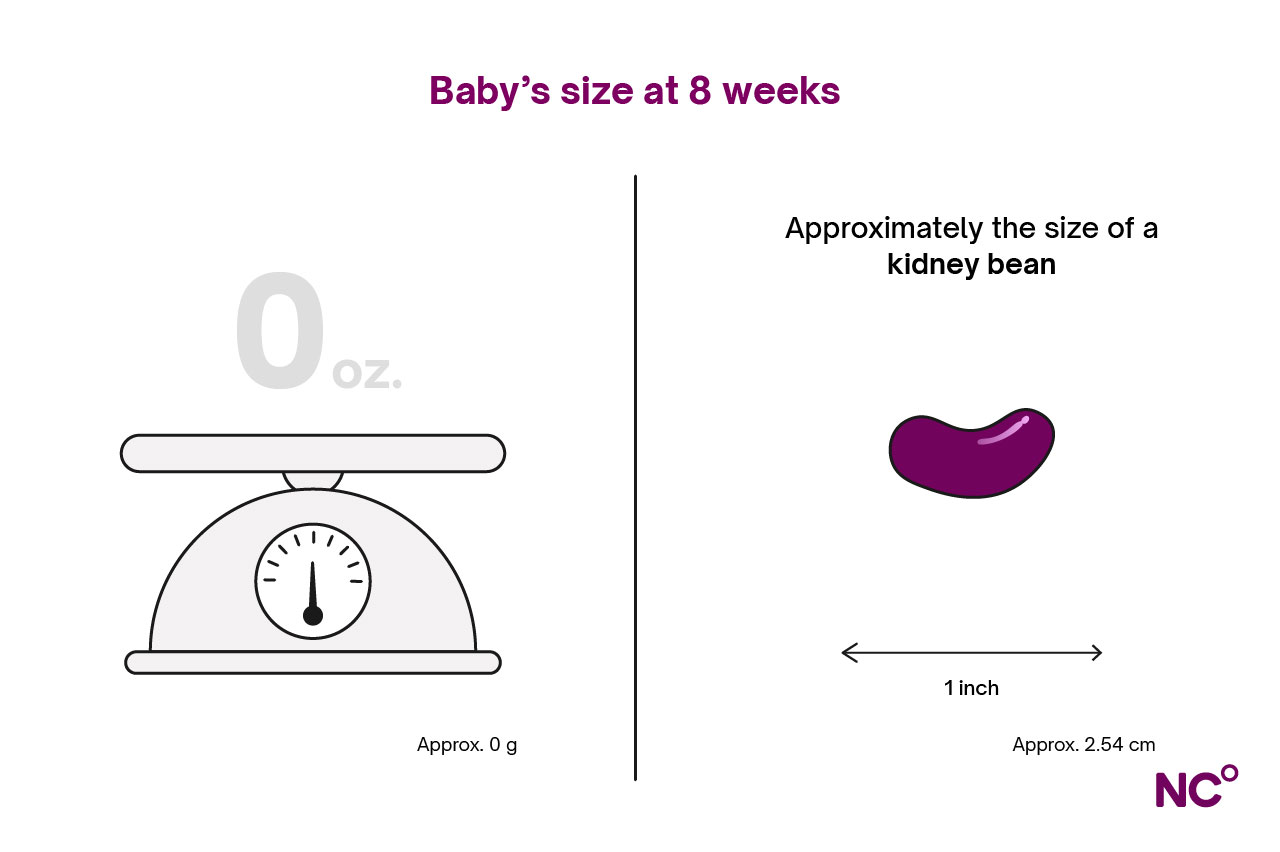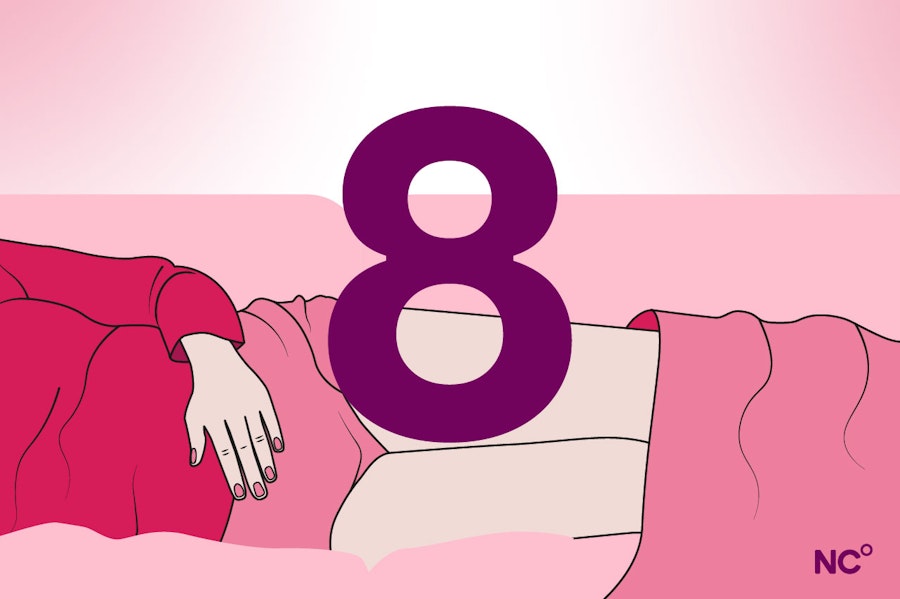8 Weeks pregnant: Pregnancy symptoms & tips
Follows NC° Editorial Policy
At Natural Cycles, our mission is to empower you with the knowledge you need to take charge of your health. At Cycle Matters, we create fact-checked, expert-written content that tackles these topics in a compassionate and accessible way. Read more...
Key takeaways
- At 8 weeks pregnant, classic pregnancy symptoms like morning sickness may be in full swing — and you may be noticing changes like tender, swollen breasts
- Your baby is growing and developing fast, with neural pathways and early breathing structures taking shape
- Prioritize self-care, nourishing your body, and tracking your symptoms to stay in tune with your changing needs
At 8 weeks pregnant, your pregnancy journey is well underway. Whether you’re still processing the news or feel like you’ve settled into a rhythm, the changes — both physical and emotional — are likely picking up pace. Pregnancy symptoms may be ramping up (or just beginning), and the embryo is developing quickly. With key structures forming and a tiny heart beating strong, big things are happening behind the scenes. So, if you’re feeling wiped out, take it as a sign that your body is doing exactly what it needs to do. Be gentle with yourself this week — you’re carrying a lot, in every sense.
Pregnancy symptoms at week 8
Hormones like human chorionic gonadotropin (hCG) are at their peak during this time, which means your symptoms can be… well, intense. The good news? There is a light at the end of the tunnel, as first trimester symptoms like morning sickness are likely to clear up by the middle of the second trimester (if not sooner) [1,2].
Morning sickness: A sour, upset stomach is one of the most ‘classic’ pregnancy symptoms — and no, it doesn’t just show up in the morning. Around 70% of pregnant people deal with nausea and/or vomiting during pregnancy [3], and week 8 is (unfortunately) a prime time for this symptom to arise.
If you’re struggling with severe morning sickness and can’t keep fluids down, talk to your provider. It may be hyperemesis gravidarum (HG), a more serious condition that requires care [4, 5].
White discharge: You may notice a thin, white, and mild-smelling discharge during week 8 of pregnancy. This is totally normal, as it helps protect the birth canal from infection. But if it’s strong-smelling, yellow/green, or causes itching, check in with your provider [6].
Swollen, tender breasts: You might notice your breasts feeling fuller and more sensitive around week 8. Some people also experience a tingling sensation or see more visible veins. Your nipples may darken too — all normal signs of early pregnancy. These changes are driven by hormonal shifts and your body’s early prep work to produce breast milk later on [7, 8].
Abdominal bloating: During these earlier weeks of pregnancy, you may feel a bit bloated thanks to slowed digestion as a result of hormones. This symptom is common (in fact, it’s been reported that over 60% of pregnant people experience bloating). Drinking plenty of water, eating fiber-rich foods, and moving your body gently can help [9, 10].
Your baby’s development at week 8
Though still tiny — about the size of a bean — the embryo is making major developmental leaps.
Taking shape: Goodbye, tail! Your embryo’s body is starting to straighten out as the embryonic tail fades away and the tiny head begins to uncurl [11].
Heart beating and developing: At this stage of development, the embryonic heart is becoming more complex, with valves and ventricles beginning to form — an important step in building the circulatory system [12].
Brain foundations: Your baby’s brain is developing rapidly, with early signals helping different parts of the brain grow and specialize. These lay the foundation for all future movement, thinking, and senses [13].
Breathing structures: By week 8, the tiny tubes that will become your baby’s windpipe and lungs are starting to form, setting the stage for breathing later on [14].
Arms, legs, fingers, and toes: The embryo’s arms and legs are growing beyond simple limb buds. They’re now lengthening and starting to bend at the joints, with tiny webbed fingers and toes beginning to form [11, 14].
Movement begins: Speaking of limbs, although you can’t feel it yet, your baby is already starting to wiggle and shift inside the uterus. Don’t worry — you’ll be able to feel those movements before long [15].
Your baby’s size at week 8: The embryo measures just over an inch and is about the size of a bean [16].

Note: We’ll often refer to your baby as an “embryo” in these early pregnancy articles. While the pregnancy timeline is typically divided into three trimesters, fetal development is divided into four stages. Your baby is technically considered an embryo until the end of week eight — about halfway through those four stages. Learn more about the difference between an embryo and a fetus here.
Is 8 weeks pregnant considered 2 months?
Yes! Pregnancy is typically measured in weeks, but 8 weeks falls at the end of your second month. This timing can feel confusing, because months aren’t technically four weeks each — some are a little longer — so the weeks don’t always line up perfectly with calendar months.
That said, don’t stress about converting weeks to months. Your healthcare provider will mostly refer to your pregnancy in weeks, as it gives a more precise view of development. You can also use the Natural Cycles app to keep track of where you are in your pregnancy and follow your body and your baby’s development week-by-week.
Tips for 8 weeks pregnant
Nourish and hydrate your body: What you eat — and drink — matters more than ever during pregnancy. Focus on whole, nutrient-rich foods like leafy greens (rich in folate), legumes (packed with iron), and lean proteins, and don’t forget to hydrate. Drinking plenty of water can ease common symptoms like headaches, constipation, and fatigue. Here’s a helpful guide on what to eat when pregnant [17].
Make rest a priority: Tiredness can hit hard in the first trimester [18]. Listen to your body and prioritize sleep and rest whenever you can — even short naps can make a difference. Give yourself permission to slow down, say no to extra commitments, and create a cozy bedtime routine to help you recharge .
Soothe morning sickness: Nausea hitting hard? Try eating small meals more often to help settle your stomach. Stick with gentle, carb-based foods (toast, pasta, crackers, or rice are often easiest to keep down). You can also try natural soothers such as ginger tea, peppermint, or Vitamin B6, which has been shown to help with morning sickness. You’ll typically get enough Vitamin B6 from your diet, but in the case of morning sickness, your health care provider may prescribe a B6 supplement – always consult with a healthcare provider before starting any new supplement during pregnancy [19].
Move your body (gently): Light exercise can boost your energy, improve sleep, and ease common pregnancy discomforts. Experts recommend aiming for about 150 minutes of movement per week — about 20 minutes per day — but even a little activity can make a difference. Always check with your provider first to learn what kinds of workouts are right for each trimester. Learn more about exercise during pregnancy [20].
Keep the germs away: You’re at a higher risk of illness during pregnancy, so it’s important to take extra care in supporting your immune system. Wash your hands often, be mindful of germs, and rest up when needed — your body will thank you [21].
Keep track of your symptoms: If you haven’t already, now is a great time to start documenting your pregnancy journey. From cravings to questions, keeping a record of your pregnancy helps you tune in to what your body is telling you. NC° Follow Pregnancy lets you log symptoms, jot down notes, and spot helpful patterns — making conversations with your provider that much easier.
Decide when (and how) to share your news: There’s no “right” time to tell people you’re pregnant. It’s entirely up to you. Some parents-to-be wait until after the first trimester, when the risk of miscarriage decreases, while others choose to share earlier with close family or friends who can offer support. Think about what feels comfortable for you and your partner, and remember that the choice is yours.
Get tracking tools, guidance, and support with Natural Cycles
Natural Cycles is here to support you from pregnancy through postpartum and beyond. NC° Follow Pregnancy lets you log symptoms and stay updated on your baby’s growth every week, while offering support for the physical, emotional, and mental changes you might face. After your baby arrives, NC° Postpartum provides expert advice to help you confidently navigate the postpartum period. And when you’re ready to use contraception again, NC° Birth Control provides a certified hormone-free option, based on the science of your cycle. Discover how Natural Cycles can support you every step of the way.
Did you enjoy reading this article?
